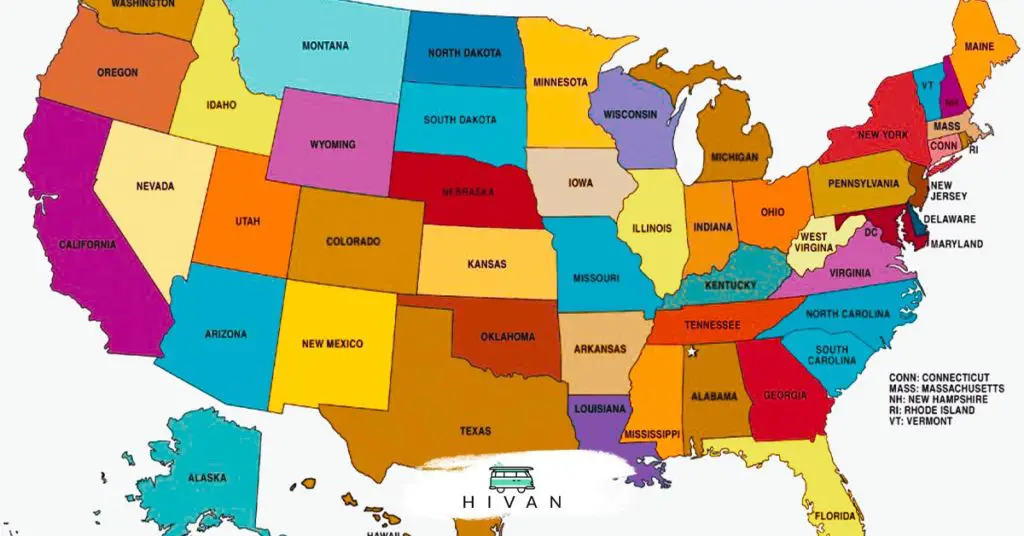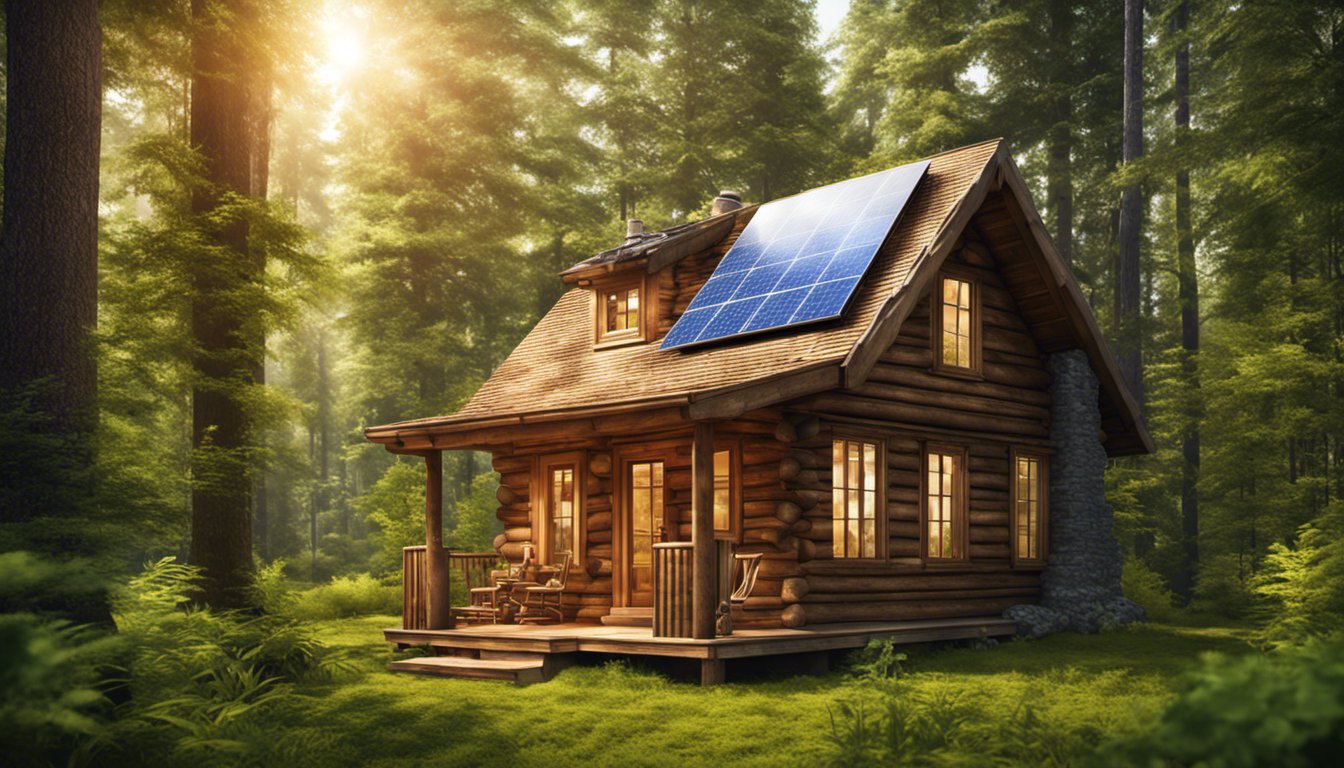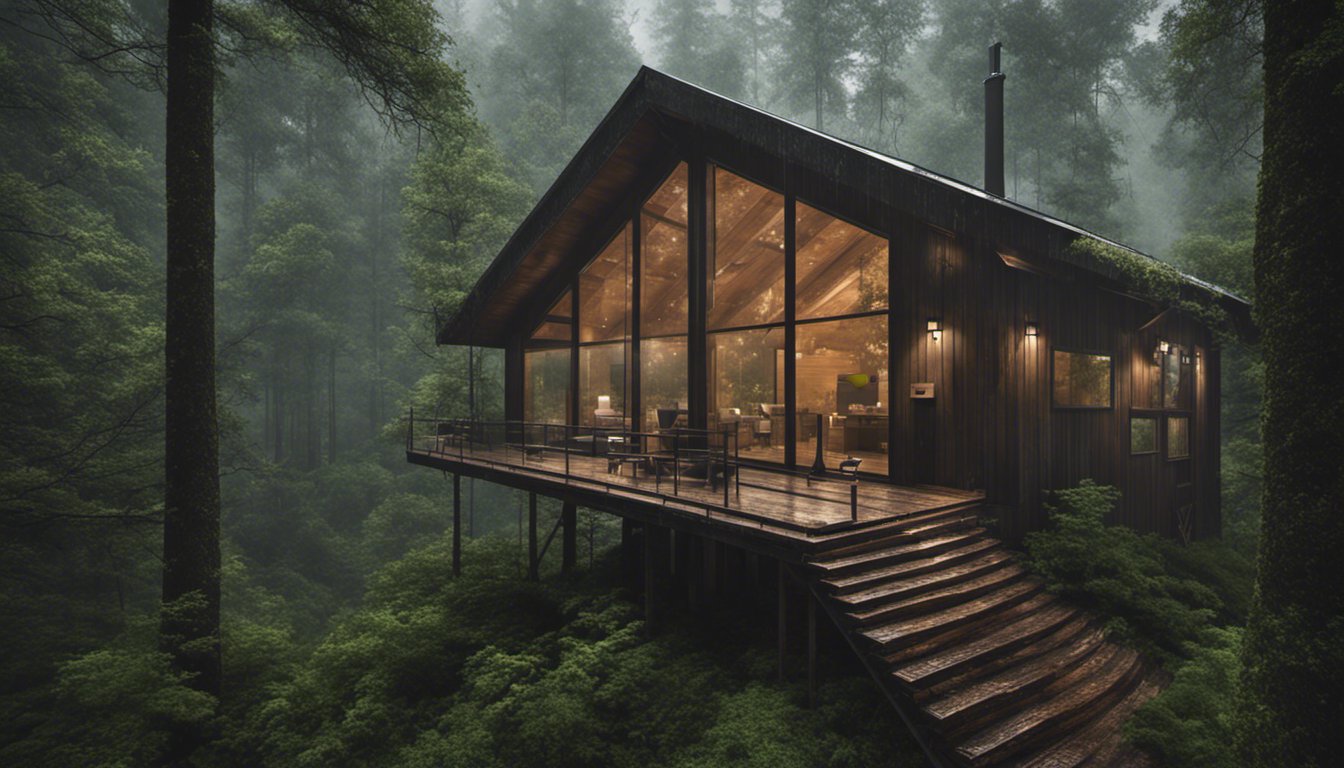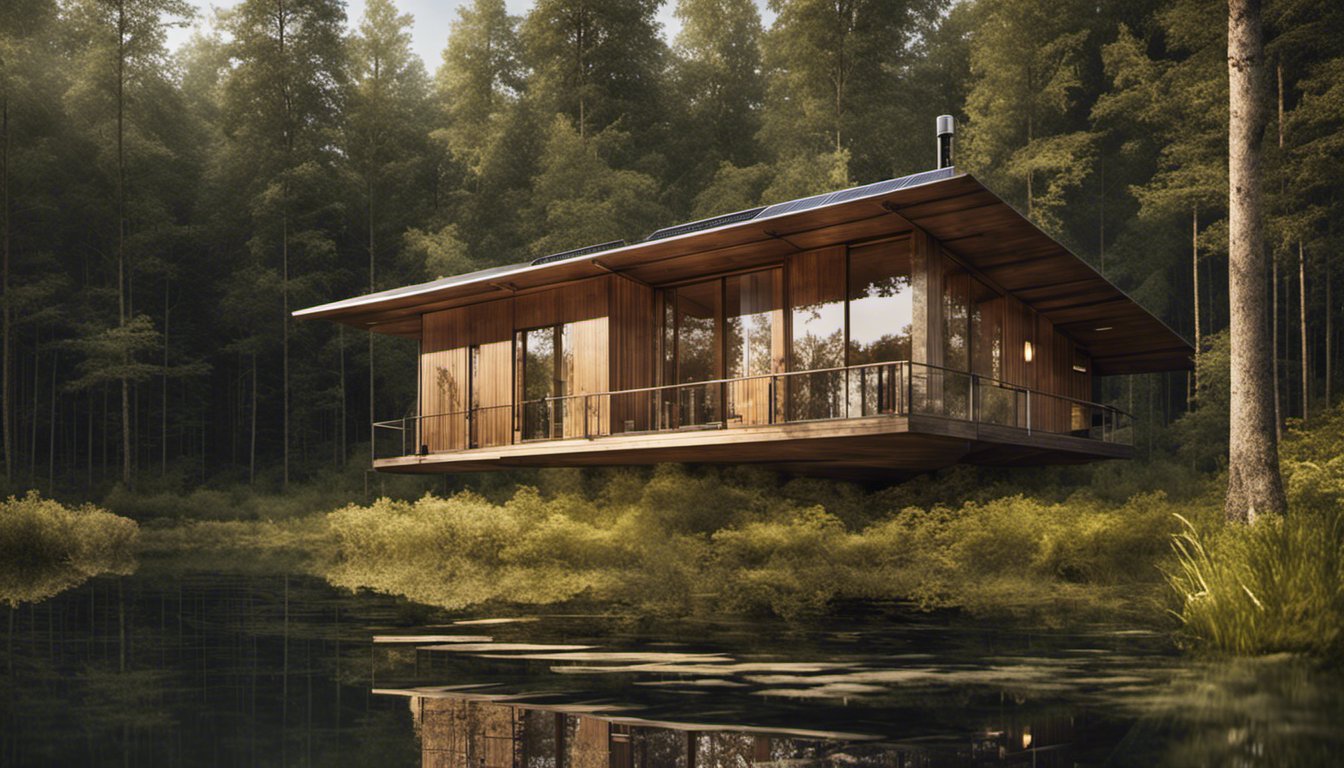Off-grid living is a lifestyle in which one is self-sustained and depends on almost no public utilities. It involves utilizing the land to provide amenities like electricity, water, and food. But what states prohibit this lifestyle, and what states should you avoid if you want to live off-grid?

Here are the 14 worst states for off-grid living:
- South Dakota
- Pennsylvania
- Mississippi
- Michigan
- Tennessee
- New York
- Alaska
- Montana
- Indiana
- Minnesota
- Ohio
- Illinois
- Missouri
- Oregon
Off-the-grid living is legal in most states in America, but it is more challenging to have that kind of lifestyle in some states than in others.
To establish this classment we took into account different factors such as, the amount of sunshine available, the average number of rainy days per year, the temperature, the price of land, and many more.
Keep reading to know more about the worst states for off-grid living and learn why it is more difficult to live off-grid there.
Important factors to consider when living off-grid
If I were looking to live off-grid in a self-sufficient home, there are several factors that I would consider when choosing a state to live in. These factors include:
- Climate: The climate has a significant impact on the feasibility of living off-grid. States with harsh winters or dry summers may make it more difficult to grow crops or generate energy. It is also an important factor to consider if you want to generate your energy from either wind, solar, or hydroelectric.
- Water availability: Having a reliable source of water is essential for both growing your food and sustaining your daily life. Without access to a reliable water source, living off-grid can be challenging, especially in areas with infrequent rainfall.
- Renewable energy resources: Wind, solar, or hydroelectric power allows you to generate sustainable and self-sufficient power without relying on non-renewable resources or public utilities. It also reduces environmental impact and provides greater independence and resilience.
- Land availability: Living off-grid often requires a significant amount of land, so it’s important to choose a state where land is affordable and available.
- Income Taxe: If you earn income from a job, business, or investments, you may be required to pay income taxes, regardless of whether you live on or off the grid.
- Population and crime rate: Choosing to call a place home where the population is sparse, and the crime rate is low warmly reduces the odds of any unwanted surprises for your off-grid journey.
We gathered data on each of these factors and identified the 14 worst states for living off-grid. These states were in the lowest ranking regarding thease 6 different points and by avoiding them, you can increase your chances of success and reduce the challenges of living off-grid.
Worst states to live off-grid with Solar Panel

It’s difficult to determine the worst state to live off-grid with solar panels as it depends on several factors such as the amount of sunlight the state receives, local regulations, and the cost of solar installation.
As a result, we chose to prioritize the main factor, which is the annual amount of sunshine that each state receives.
You can search by state and choose to sort each column in ascending or descending order.
For states where we were unable to find sufficient data, we used a “-” to indicate the lack of information.
We create an indicator called “Solar Power feasibility” by using the following logic:
Solar Power feasibility = (Average Annual Hours of Sunshine – Average days of rain each year/365)
It results in a percentage indicating the average quantity of sun throughout the year.
Here’s what we found to be the 14 worst states for off-grid living using solar power:
- Mississippi
- Pennsylvania
- Alaska
- Ohio
- Washington
- New Hampshire
- South Dakota
- New York
- Michigan
- Vermont
- Oregon
- New Jersey
- Wisconsin
- Minnesota
States that receive the lowest amount of rainfall

Living off-grid requires a reliable source of water, and areas with low rainfall may make it more challenging to access water for these purposes.
In addition, areas with low rainfall may be less suitable for growing crops or generating hydroelectric power, which can limit the ability to be self-sufficient.
Therefore, to establish our classement when considering water availability, we used two metrics:
Water availability= Average Annual Precipitation (inches) + Average days of rain each year
Here’s what we found to be the 14 worst states for off-grid living considering water availability:
- Wyoming
- Arizona
- California
- South Dakota
- Montana
- Nevada
- Arkansas
- Tennessee
- Nebraska
- Idaho
- Colorado
- Indiana
- Iowa
- North Dakota
More details about the data:
Average days of rain each year
| Mean number of Days with Precipitation 0.01 Inches or More: This table shows the mean number of days per month with at least 0.01 inch of precipitation. This is the smallest amount of precipitation numerically recorded, and it includes the liquid water equivalent of frozen precipitation. The frequency of days with precipitation should not be considered as the frequency of cloudy days. Source: noaa.gov |
Average Annual Precipitation (inches)
| Normal Precipitation, Inches: The normal precipitation is the arithmetic mean for each month over the 30-year period, adjusted as necessary, and includes the liquid water equivalent of snowfall. Source: noaa.gov |
Worst states to live off-grid considering the price of land

It’s difficult to determine the worst state to live off-grid regarding price as it depends on several factors, such as:
Land cost: Living off-grid often requires a significant amount of land, so it’s important to choose a state where land is affordable and available.
Housing cost: The cost of building or purchasing an off-grid home can vary widely depending on the location and materials used. It’s important to consider the cost of housing in the state you’re considering.
Cost of living: The cost of living in a state can significantly impact your ability to live off-grid. States with high costs of living may make it more difficult to afford the necessary supplies and equipment for off-grid living.
Tax rates: State tax rates can vary widely and can impact your overall cost of living. It’s important to consider the income and property tax rates in the state you’re considering.
As it is difficult to gather data for the housing cost and cost of living for each state, we decided to focus only on the price of land.
Here are the 14 worst states to consider when looking to buy a piece of land to live off-grid:
- Rhode Island, with a price per acre of $ 94’835
- Florida, with a price per acre of $ 74’699
- New Jersey, with a price per acre of $ 73’874
- Hawaii, with a price per acre of $ 71’954
- Delaware, with a price per acre of $ 71’096
- Massachusetts, with a price per acre of $ 60’306
- Maryland, with a price per acre of $ 38’686
- Utah, with a price per acre of $ 36’410
- Connecticut, with a price per acre of $ 34’397
- Illinois, with a price per acre of $ 33’629
- Indiana, with a price per acre of $ 28’291
- South Carolina, with a price per acre of $ 25’493
- California, with a price per acre of $ 24’534
- North Carolina, with a price per acre of $ 24’276
Here’s all the data for all the states plus their respective income tax average.
More details about the data:
Price per acre ($ in 2023)
| Data is from landsearch.com which is a listing platform to sell and buy land. Source: https://www.landsearch.com/price |
Average Income Taxe (% in 2023)
| State individual income taxes in 2023 source: https://taxadmin.memberclicks.net/current-tax-rates |
Most dangerous states to live off-grid
The United States typically has higher crime rates compared to other developed nations.
In 2020, the national average crime rate stood at 1,635 per 100,000 people.
However, there’s considerable variation among states. Alaska has the highest rate at 837.8 crimes per 100,000 people. It is mainly a result of high assault and sexual assault rates, closely tied to alcohol and drug abuse, along with its relatively small population spread over a vast area.
In contrast, Maine boasts the lowest rate at 108.6. Other states with low rates include New Hampshire and Vermont.
Southern states tend to have higher rates than Northern ones, and urban areas generally have more crime than rural areas.
Here are the 14 worst states to live off-grid because of their crime rate:
- Alaska
- New Mexico
- Tennessee
- Arkansas
- Arizona
- Louisiana
- Missouri
- South Carolina
- South Dakota
- Michigan
- Montana
- Nevada
- Oklahoma
- Alabama
Here’s the data for all the states plus their respective population density.
More details about the data:
Crime rate (violent crime incident/100k habitant)
| Data from 2020 |
Population Density
| Data from 2022 source : https://wisevoter.com/state-rankings/population-density-by-stateS |
Worst states for off-grid living
Are you looking for a remote place to live self-sufficiently amid nature?
Some states may be more favorable than others depending on your personal preferences and different factors we saw earlier.
This is way, we compiled a list of the worst states for off-grid living using a simple methodology.
Methodology
We collected publicly available data in the table below for all 50 states.
We’ve evaluated all states using 8 essential criteria, including the amount of sunshine per year, the average annual precipitation, and the affordability of land. Additionally, we’ve taken into account factors such as the average income tax and the crime rate.
These factors were grouped into 3 categories: natural resources, price of land, and population. It is the data you saw in the previous tables.
Weighted scores were calculated for each state in each category, and the scores were then totalized across all categories.
The state with the highest average score was ranked “Worst,” while the state with the lowest was ranked “Best.”
We finalize our little study with the following ranking for the worst states to live off-grid:
- South Dakota
- Pennsylvania
- Mississippi
- Michigan
- Tennessee
- New York
- Alaska
- Montana
- Indiana
- Minnesota
- Ohio
- Illinois
- Missouri
- Oregon
Of course, there are many other factors that could have been considered, such as the quality of the state’s infrastructure (phone coverage, roads, power lines, public transportation, healthcare, etc.) and its Natural Hazards Index.
If you want to explore other studies that rank the best states to live off the grid, you can visit lawnstarter.com. Or there is also this great youtube video by Let’s Travel!
You can also compare how each state performed for each factors in the next tables that gathers most of the data we collected.
Sources:
Sunshine – Average Percent of Possible
Normal Precipitation, Inches
Normal Daily Mean Temperature,°F
Mean number of Days with Precipitation
Price of land
Taxes
Crime rate
Population
